Spotlight on SAS roles
More than 1 in 5 of the anaesthetic workforce are SAS doctors, a collective term for Specialist, Associate Specialist and Specialty Doctors. All SAS doctors have a minimum of two years specialist training but many have much more experience. These profiles of some of our members illustrate the wide variety of skills and experience of SAS doctors.
The grade can sometimes be misunderstood and we are keen for SAS doctors to get the recognition they deserve. #SASdoctorheroes. Do send your profile to comms@rcoa.ac.uk.
“As a SAS Wellbeing Lead at the College, I hope this initiative will go some way to boosting pride in being an SAS and improving wellbeing.”
Dr Sunil Kumar
Council Member
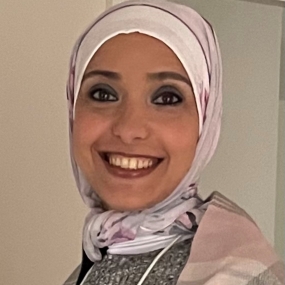
Dr Jehan Abdulmajeed, Specialist Doctor, University Hospitals of Leicester
My name is Jehan. I’m a specialist anaesthetist. I’m the SAS advocate for University Hospitals of Leicester. I have 20 years of experience in anaesthetics, 14 of which are in obstetric anaesthesia.
I trained overseas and after my masters degree, I worked in maternity hospital in the Gulf for 6 years. During that time I passed the European Diploma and I registered with GMC.
I came to the UK in 2015 as a clinical fellow in obstetric anaesthesia. It was for one year. Then I relocated with my family to Leicester and in all honesty, I was reluctant to apply for speciality doctor job as from what I heard it’s a dead-end job. And this was against my dreams and passion about anaesthesia since I qualified. But because there were no jobs and I sat at home for few months, I applied for a speciality doctor post.
After I started the job I decided to finish FRCA exams, which I did in 2019 and I planned to pursue the CESR pathway. And I’m not going to lie, it was a roller coaster ride for me for about three years, trying to get assessments, getting the balance between work and family, it is worth mentioning here that my husband is a doctor as well and he’s following the same path, so it was near impossible for both of us to chase our dreams with no family support while trying to look after our daughter. So, I had to make a decision to enjoy what I’m doing and accept the reality. To be honest it was not an easy decision and I felt that I failed in fulfilling my dreams, but this is life. You can’t have everything.
At the time of my decision to stay as a speciality doctor, the new 2021 contract came out with the specialist post. So, I thought it is a great chance for me to explore this option, my trust was very supportive and they created the job for me. I applied to be the SAS advocate at the same time as I saw this as an opportunity to help people in my group. I was appointed in both posts simultaneously and I’m enjoying my career since then even more than I did in the past. I’m so proud to be SAS and I don’t regret my decision anymore. Every day I am developing and learning more skills as an autonomously practising physician and I have a great work life balance, that I was missing for years.
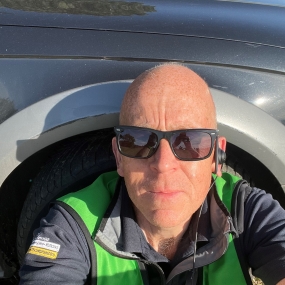
Speciality Doctor in Anaesthesia at the Queens Medical Centre, University Hospitals of Nottingham NHS Trust
I have been an SAS anaesthetist since 2004.
I was a hard-working trainee. I made good progress through the curriculum, was adept at learning in the workplace and was a trusted member of the on-call team, however, the rotations, examinations – with which I struggled - led to me losing my peer-group of trainees. I “fell out of love” with the profession and almost left anaesthesia. The College Tutor and Head of Service fortunately recognised both my ability and usefulness to the department. They offered me a staff-grade contract to give me time to consider my options.
I mourned the lost trainee status and joining the non-consultant ranks – a group that previously, appeared in the shadows of departments. However, I began to see the opportunities - I decided that anaesthesia was very much for me but by now, training had moved on and re-entering training was a fading prospect.
Ultrasound Guided Regional Anaesthesia was in its infancy, the department had a consultant with an interest in research and the development of USGRA techniques. Working with him and his research fellow, I found myself presenting at an international meeting. This demonstrated to me that my new role had the same possibilities attached to it as remaining in training and my reservations about becoming a member of the SAS ranks were gone.
Fast forward. I am a senior SAS doctor. I work independently. I am an appraiser – a role that I greatly enjoy. I am part of the Fragility Fracture Steering Group - a hugely satisfying role which produces rolling quality improvement in the care of patients with fragility fractures from ED to discharge. I deliver workplace training and assessment to all levels of trainee. I am a TRiM practitioner. Outside of the hospital, an interest in equestrian sport developed an interest in pre-hospital care and event medicine and becoming a team member of a number of high-profile events including the Burghley Horse Trials. In 2021 I was awarded the Association of Anaesthetists Evelyn Baker medal – this recognises the “unsung heroes” of anaesthetic departments and their contributions. To me, this represents the highest form of “multi-source feedback”.
My SAS career has led me in directions that I had not considered and has proved to be both challenging and rewarding. I have seen the value of SAS doctors in the NHS grow exponentially along with their status as clinicians, teachers and managers. I see the arrival of the Specialist grade to be overdue and a logical progression in recognising this capable group of professionals in healthcare.
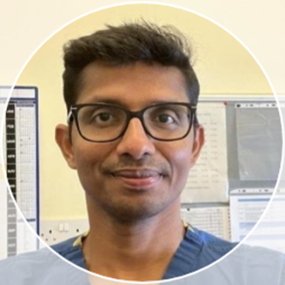
Specialty Doctor -Anaesthetist, Acute Pain/PACU Lead
North West Anglia NHS Foundation Trust - Hinchingbrooke Hospital
My name is Sivaprakash Vaitheeswaran, I have been proudly working as a SAS doctor in anaesthetics for nearly 10 years.
I was a trainee in Emergency Medicine before I fell in love with anaesthetics, I completed my core-training in anaesthetics and landed hesitantly in my current post as a SAS doctor due to family commitments, the initial plan was to go back to the training ASAP which didn’t happen as per plan. I reluctantly continued my job thinking it will be a dead end of my career.
I soon realised that there is series of opportunities to develop in my clinical experience particularly in regional anaesthesia which led me to take a leadership role as acute pain team lead for my department.
I introduced regional anaesthetic pathways for multiple ribs fractures, rectus sheath catheters for laparotomies, currently working on an accelerated/day case arthroplasty and a block room for awake upper limb surgery. I am an ALS instructor, enjoy teaching on the course as an educator.
I am really proud of being an SAS doctor, not only do I have a perfect work life balance, I am also able to enjoy my various professional roles which motivates me to develop further in my career. I would like to thank my department for their encouragement and support allowing me to develop as a senior SAS doctor.
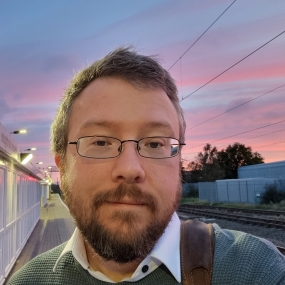
Specialty Doctor (SAS) Anaesthetist
Sherwood Forest Hospitals NHS Foundation Trust, Sutton-in-Ashfield
I have been a Specialty Doctor (SAS) Anaesthetist for a just over a decade. I started my career in anaesthesia in a formal training programme but struggled to balance all the aspects of my life as a trainee with my life outside of medicine. I therefore decided to become a Specialty Doctor to better manage my work-life balance.
I have never let being a SAS doctor define the limits of my career. I have continued to develop and progress as an anaesthetist, including completing my postgraduate exam journey. I passed the final FRCA after many years as a Specialty Doctor, and then wrote about my experiences in the RCOA Bulletin. I have also developed clinically and furthered my interests in obstetric and regional anaesthesia.
I have represented my colleagues in various fora, for many years. I was a SAS representative on a Trust Local Negotiating Committee, and part of the RCOA SAS committee. I was elected to the board of the Association of Anaesthetists in 2019 and have just completed my two-year term as chair of the Association SAS committee. I am now the Honorary Membership Secretary Elect at the Association and hope to continue to represent the interests of all anaesthetists at a national level in this role. Being a board member at the Association has presented me with some incredible opportunities. I have helped to write national guidelines and have helped organise and chaired sessions at international conferences.
I undertook a region-wide survey of TIVA practice and error in the East Midlands, used the results to create a patient safety initiative, and then rolled this out within my Trust. This work was then published in Anaesthesia News. "PERUSE before you Infuse" posters are now on the walls of anaesthetic rooms in multiple Trusts across the country.
I hope to be a force for good in the world. So much of what happens to SAS and locally employed doctors comes down to the culture and expectations associated with the roles, rather than what the contracts or national documents actually say. Through advocacy, and shining a light on these things, we can hope to make them better. To this end I write a lot of articles for Anaesthesia News and the RCOA Bulletin, I give a lot of presentations, and I tweet a lot!
Imagine what we could achieve with the same workforce if every doctor realised they could choose a SAS career, and still be able to achieve their own individual potential as an anaesthetist. Imagine how many more colleagues we might retain if we were to better support this "alternative career pathway" as a career choice.
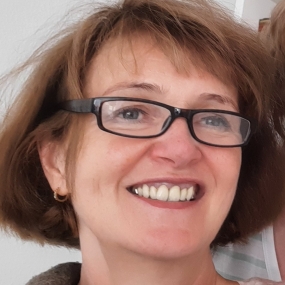
Oxford University Hospitals
I am an Associate Specialist Anaesthetist at Oxford University Hospitals and have been a SAS doctor since 2003. In addition to my clinical work I am an Educational Supervisor, Trust appraiser and Coach. I have represented my colleagues locally on the Local Negotiating Committee as a trade union rep for 15 years and nationally as a Trustee and Council Member at the Royal College of Anaesthetists for 6 years.
What motivates me is to play a small part of the big machinery of a health service that is free at the point of use to all that need it, regardless of their financial resources, for as long as the NHS remains functional.
As a SAS anaesthetist I would like to be a role model for reliable, professional and safe anaesthetic care. In my non-clinical activities I aim to show that SAS doctors can make a valuable contribution to the leadership, management and governance of professional organisations. I am proud that my volunteer work has been recognised by the RCoA with a College Medal.
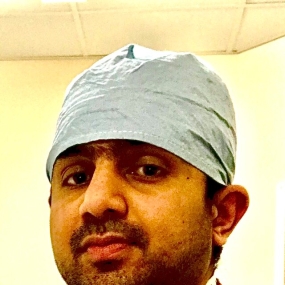
Cumberland Infirmary Carlisle Since 2021
Previously trust grade doctor at the same trust from 2019
I am an Anaesthetist since 2013 and I love my job. Being a SAS doctor gives me the liberty to use my expertise and skills to bring smiles in my patients face.
The recognition I get from my patients, colleagues, and staff keeps me going and strive for the best. A patient recently asked me if she can give a 5-star rating at trust pilot for my anaesthetic and OR team. How can I not be motivated after this?
I am most proud of my department. There is a sense of camaraderie within every member of the staff in our small but highly skilful team. Despite being a SAS doctor I have been encouraged in academic activities, research, presentations and teaching the trainees. My department has always supported me through thick and thin. I am proud to be associated with the Department of Anaesthetists and Intensivists at the Cumberland Infirmary Carlisle.
I have been trained in India and I am still associated with academic activities at my alma mater. Beyond my role I have been involved in teaching activities for post graduates, as a presenter in online and face to face CMEs. It is my humble effort to spread and improve quality of anaesthesia practises to the young budding anaesthetists.
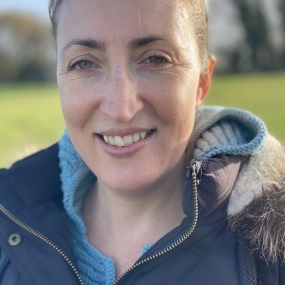
Divisional Wellbeing Lead , Psychoanalytic Psychotherapy Trainee
SAS Doctor for 8 years
“The problem with stereotypes is not that they are untrue, but that they are incomplete” Chimamanda Ngozi Adichie. The Danger of a Single Story.
Another problem with stereotypes is that the subject can come to internalise the fixed caricature of themselves…and believe it to be true and defining.
The stereotype of an SAS Anaesthetist is of someone who failed to CCT. That is the single story that is repeated and reinforced within our profession. The stereotype is not untrue in my case – I did fail to CCT. But I am no failure.
I welcome the opportunity the RCoA is giving SAS Anaesthetists to publicise our complex stories, to broaden the perspective and to educate ourselves and others out of our mistaken beliefs around failure.
I work alongside a number of wonderful colleagues who I value and admire. For me, I have achieved the Holy Grail whereby work has become play. Every day I can become immersed in the detail of my work. Lost in the mastery of meticulous tasks and in the intricate ways I can refine and enhance my practice. Learning amongst friends, noticing, experimenting, repeating – pure joyous play. The pride and satisfaction I gain from performing a procedure in the very best way I can, is exquisite. The thrill I get from galvanising a team and cheering them on, is immeasurable. And the professional fulfilment I experience when I connect with my patients, assuage their anxiety and provide a good (or unremarkable, or ‘better-than-last-time’) experience of anaesthesia – that matters to me. The positive impact of my work becomes profoundly healing.
I started out on a solid track with a golden ticket, clear direction, huge ambition and promise. Then, equally sturdy and steadfast road blocks emerged and had to be dealt with. Where I am, is not the future I imagined when I set out. I have grieved that loss. But whilst this future is different to the one I planned, I live in it full of gratitude, with new direction, huge ambition and promise.
The joy and the play and the worth that I derive in each day that I work as an SAS Anaesthetist, affirms to me again and again and again that I am no failure. The reductive stereotype of myself can be declined.
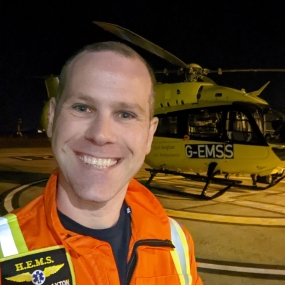
Northern Lincolnshire & Goole NHS Foundation Trust
I'm Mark and I've been an SAS doctor at a district general hospital since 2017, having left trainee due to physical health issues. I like the variety of challenges that working in theatre, critical care and obstetric anaesthesia provide and I'm fortunate to work in a department that values the experience of its SAS team.
Over the last year, a number of us have been given leadership roles and I have taken on the department lead role for emergency anaesthesia and resuscitation reflecting my experience as an ALS medical director and EPALS instructor as well as my long-term experience as a pre-hospital clinician.
SAS doctors within my department take an active role in training of medical students, foundation doctors and speciality trainees and I took the lead in designing our induction program as well as delivering the face-to-face critical care sessions. I was also fortunate enough to be chosen to attend advanced ventilator training alongside several of our critical care consultants in order to become one of the department's "Clinical Experts".
Outside of the hospital, I am employed by East Anglian Air Ambulance as an Emeritus Fellow in Pre-Hospital Emergency Medicine and regularly undertake HEMS shifts where my anaesthetic & critical care skills are in daily use. I also volunteer extensively with a number of organisations including St John Ambulance, where I am an Event Doctor as well as District Clinical Officer, and LIVES (my local BASICS charity) where I work as a Medical First Responder and Critical Care team member.
As an SAS anaesthetist, I am afforded the trust to undertake advanced clinical procedures, including pre-hospital anaesthetic & sedation, for both of these organisations. Away from anaesthesia, I am employed as one of the regional medical examiners and have found that my experiences reviewing patients as part of critical care referrals has meant that I can rapidly review a set of notes and draw sensible conclusions. I am an SAS doctor by choice and the flexibility given by my role allows me to enjoy a portfolio career as well as maintain a work-life balance that keeps me happy during these difficult times.
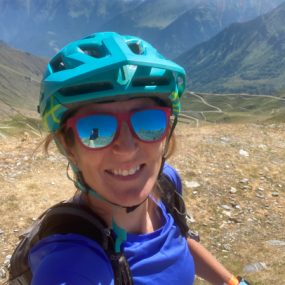
A specialty doctor for 4.5 years
What motivates me?
I feel very fortunate to be an SAS doctor. How many people get to do the job they love in a supportive and friendly department? I enjoy the flexibility being a specialty doctor gives me: I have all the autonomy I want with all the support I need. At work I enjoy emergency out-of-hours care in emergency theatres, obstetrics and critical care.
My loves in life are triathlon and music. Obviously my two primary-school-age boys feature highly too (!) It quickly became apparent that to me that, although I had always enjoyed training, rotating annually to different locations, organising leave, LTFT training and specific working patterns were not going to fit in with 2 children, running clubs, 2 bands and training for triathlon. It made sense to me to progress my career at my own pace, in a hospital I knew and liked in a department that would support me to do so.
What have I achieved beyond my role? What am I most proud of?
Outside of my clinical role I enjoy being an educational supervisor to core trainees: I think getting the opportunity to work together out of hours and having a different viewpoint on training and careers is valuable to others. I also instruct on several courses and run FRCA teaching sessions for our trainees.
I am proud of so many things: I am proud that I always enjoy coming to work, I am proud of every thank you note I get from patients, I’m proud of my FRCA and, of course, I am proud of every QOM on Strava.
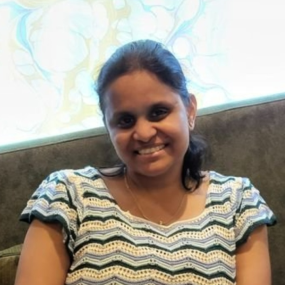
SAS Doctor for 1 year 3 months
Motivation : As a SAS doctor I get more clinical work and less administrative duties than Consultants. I have always enjoyed treating someone being physically present there and spending time with them. I am often the patient's first point of contact to my department which gives me a good chance at making a decent diagnosis and planning the way forward. I understand what I inform is the picture my Consultant gets particularly on night shifts. So I'm very cautious with my words to prioritize work and maximize care.
Even though junior doctors get good patient time/exposure, they are yet to attain my clinical experience and skill set. For example in the time a junior doctor decides an arterial line is needed for a patient, I can get a line in and have the set up running without any senior nursing assistance.
I still have my protected academic time and benefits and I would make use of them to acquire new skills in my own time (rather than trying to fit into a training schedule)
Beyond my role: My skill set is beyond the level expected out of my role and it comforts people who are supervising me- that I'll manage well yet not hesitate to ask for help at the right time. Having this camaraderie makes a work day easier for them and it makes me happy that they have confidence in me. It does adds to the responsibility but gives a sense of satisfaction at the end of every single day.
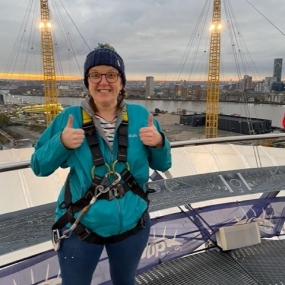
SAS doctor since 2016
I am hugely interested in quality improvement in my department, and in the wellbeing of the trainees, both in anaesthetics and in the wider hospital, which is what inspired me to apply for the role of Guardian. I can remember being a junior doctor and feeling as though nobody was particularly interested in my wellbeing. The people who showed an interest really made a difference. I am very keen on ensuring that the Doctors in Training feel supported and as though they have someone to turn to if things get difficult. This is particularly important at the moment with the strain created by the COVID-19 pandemic and its aftermath.
My main achievement in my role was at the start of the COVID-19 pandemic, when I, along with the ICU manager and clinical educator, trained the whole of the surgery and critical care directorate in the basics of intensive care, using a variety of methods including simulation, lectures, and skills stations. We also organised mass fit testing and PPE practise. Our hard work was rewarded with the extremely low rates of hospital acquired covid among the people we had trained. I am lucky to work in a hospital that supported our efforts and gave us the time and space to prepare for what was to come.
In my spare time I provide medical cover for sporting events- I am currently writing this from the Commonwealth Games, and have covered other events such as Tough Mudders, and World Triathlon Championships!
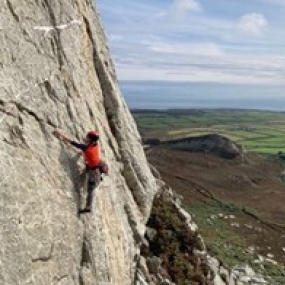
Ysbyty Gwynedd, a DGH located on the edge of the Snowdonia National Park, in North-West Wales
I am Joanna and I work in anaesthetics and ITU at Ysbyty Gwynedd, a DGH located on the edge of the Snowdonia National Park, in North-West Wales. I chose to become an SAS doctor two years ago when I finished Core Anaesthetics Training.
The decision to become a SAS anaesthetist was straight-forward. I had already spent many years pounding the treadmill of medical training, several enjoyable but intense years in academia, and more time and money on exams than I want to recall. The SAS job allowed me to step aside from the pressure of formal training and take control of where I worked and how I progressed.
For me this role is ideal. It allows clinical anaesthetics to remain the focus of my job. The hospital’s rural catchment of stoical farmers, an influx of summer caravaners, and our proximity to mountains and sea keep the work varied.
I have the support of my department to develop skills that are relevant to my day-to-day practice. I have undertaken placements at paediatric and neurosurgical tertiary centres to gain experience which would not be available in my hospital.
At the end of the day, within 20 minutes, I can be up a hill, out on my bike, climbing on world-class rock, open-water swimming (rarely) or talking to my tomato plants (increasingly). I live in a beautiful part of the UK and honestly can’t think of anywhere where I could have a better work-life balance.
In my free time I am a volunteer with Llanberis Mountain Rescue Team. This gets me out of the house in all sorts of weathers to walk up-hill carrying a heavy rucksack. It's a team effort to patch, pack and carry the casualty off the hill.
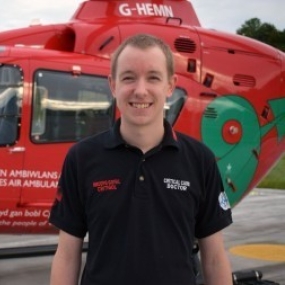
Honorary Clinical Research Fellow (Swansea University)
SAS Doctor for 8 years
My journey started as a trainee with experience of the current system failing individual trauma patients, with one in particular motivating me to effect change. Through a coffee room conversation with consultants, I joined them and started working on a national programme to make the case for change, and soon left training to pursue it as a full-time role, being part of the team setting up the Emergency Medical Retrieval & Transfer Service (EMRTS) for Wales in 2015. Originally a fixed term appointment, it led to permanent work as the service developed and my role expanded to cover communications, clinical informatics, clinical audit and latterly research. Not wanting to give up clinical medicine I also work as a locum anaesthetist, which provides the flexibility to work around the dynamics of a growing national service.
My proudest achievement is the publication of a 5-year service evaluation that included evidence of significant mortality improvements in trauma patients, improvements in care and service provision across Wales. Going back to the first patient that sticks in my mind, I now have seen countless “unexpected survivors” coming to visit our bases, and brings it all back into sharp focus, that the system can be changed through dedicated clinically led programmes. The Speciality role allows me to have a flexible portfolio career with no two days being the same!
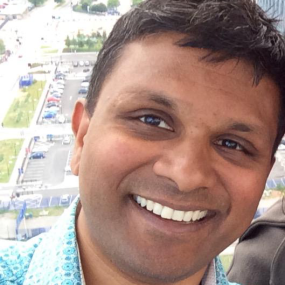
Moorfields Eye Hospital
I’m not a hero but have been a SAS doctor since 2014. A period of ill health and moving back to the UK from overseas halted my training career just as it was nearing its completion.
Finding my feet back in the UK was tough but I was lucky enough to be offered a fixed term SAS post. After 3 months I jumped at an offer to make the position permanent. The stability this offered within a supportive department allowed my confidence to grow.
By 2018 I was eager to advance in seniority, to take on greater clinical responsibility and departmental roles. The career progression I had taken for granted as a trainee was not as easily achieved as a SAS doctor, and I am driven by continual development and making meaningful contributions.
Following a successful interview, I was invited onto the SAS committee of the Association of Anaesthetists, an organisation fantastic at ensuring SAS doctors’ voices are heard. I met likeminded SAS doctors on the committee, each one talented, ambitious and driven. I drew inspiration from them and relished opportunities to contribute to the profession on a national level.
Developing in confidence and acumen, I became the SAS lead for my department, offering information, advice and support to our SAS anaesthetists.
I ran our departmental meetings and used these to create a wellbeing programme. I have trained as a mentor through the Association of Anaesthetists as well as a Schwartz round facilitator for the trust.
I wrote an article about my redeployment to the London Nightingale which was published in Anaesthesia News in 2020 and have since submitted further articles. I even compiled and edited the September 2022 edition of Anaesthesia News, something I never dreamed I’d do.
Prior to the creation of the Specialist role, I began embarking upon my own path to attain more clinical seniority.
Last year, after 7 years as a SAS doctor I bit the bullet, moved hospitals and set about achieving all of the relevant paperwork to effect a CESR application.
I hope to be a consultant one day, but I will be sad to leave the ranks of my brilliant SAS colleagues, who are an invaluable cohort of hardworking and competent doctors deserving of much more recognition.
Give SAS doctors the respect and the opportunities they deserve. Departments which nurture them will be rewarded with greater contributions from them. Everybody wins!
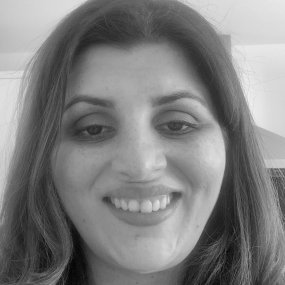
University Hospitals of Derby and Burton NHS Foundation Trust
I completed my undergraduate medical training from the University of Mumbai, India in 2001 followed by a three year Postgraduate training degree (MD) in Anaesthetics. I then came to the UK, and after passing PLAB I have worked in various NHS hospitals, gaining well-rounded clinical experience in Anaesthesia including both Teaching Hospitals and District General Hospitals.
I chose a career as a SAS doctor, in order to maintain a better work life balance with my personal circumstances and family commitments. I have been working as a Specialty Doctor at Royal Derby Hospital since 2016. I work closely with other SAS colleagues and understand the difficulties we face. I was previously selected as a wellbeing champion to promote various aspects of the wellbeing of colleagues in the department. I am a big proponent of supporting the mental health of colleagues, especially since COVID-19 pandemic and its aftereffects on the workforce, and I have worked hard to signpost struggling colleagues to appropriate services. I have also recently been co-opted onto the BMA SAS committee.
I am a mother, a woman, a doctor, a TriM practitioner and Manager, and SAS Advocate. I am the intersection of these and the experiences that made me, all of which help me to deliver quality services for the patients. It is more urgent than ever that we shape our approach to wellbeing with an intersectional lens. We must challenge and dismantle the barriers that many SAS doctors face. For our services to be truly successful and representative, advocacy must be at the core.
SAS Doctor for 18 months
What keeps you going/motivates you? I have recently moved to UK, This is the highest grade I could be eligible for. I was working as a consultant in Anaesthesia, Critical care and Acute pain management for 10years before moving here. This job gives me an opportunity to understand the health care system, hierarchy, leadership and most importantly the patient expectations. I am working on my CESR application and my current role gives me ample chance to include UK work experience. What is most important for me is to use my communication, leadership, knowledge and skills for a safe outcome and satisfied patient. In my role, I am involved in providing labour analgesia and when a mother has a pain free birth, it is the best reward for me.
What you have achieved beyond your role/What are you most proud of? Due to my special interest in pain, I have devised innovative plans to provide individualized pain relief for labouring mothers.
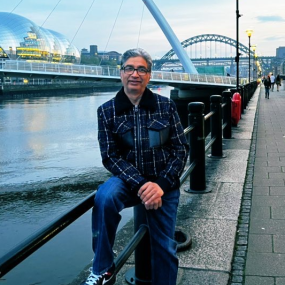
Specialist Doctor Royal Victoria Infirmary, Newcastle
SAS doctor for 20 years
Motivation: Passion for teaching, training and making difference in patient care.
Proud of: Making difference in patient care especially Mechanical Thrombectomy.
“If we always think what we have always thought, we will always be what we have always been”
(Neil James). This is the quote from the article I wrote in AAGBI Anaesthesia News.
After joining North Tyneside Hospital as a staff grade in 2002 I continued my passion of teaching, training and wanted to change the perception that ‘SAS are just a pair of hands’
Some of my day-to-day work:
- With my special interest in difficult airway management, I started Northumbria Airway Workshop (NAW) (www.naw.uk.com) in 2004. It rapidly became very popular international course.
- I teach on other regional difficult airway courses.
- To improve patient care, I got more than £50,000 from hospital charity to buy difficult airway kits, training equipment, Cardio Q and ultrasound for regional anaesthesia.
- As AAGBI SAS committee member, I contributed at national level.
- I was also on the OAA/AAGBI Obstetric Working Party and contributed to 2013 Guidelines.
In 2011, I moved to Royal Victoria Infirmary (RVI) Newcastle
- I continue to run NAW and contribute as member of difficult airway group.
- I am anaesthetic lead for Interventional Neuro-Radiology (INR). I developed INR anaesthetic guide for the department.
- In 2015 Mechanical Thrombectomy (MT) changed the way we treat large vessel ischaemic strokes. I developed communication flowchart, anaesthetic guidelines and SOP for efficient delivery of MT.
- I am on the MT steering group.
- I am an educational supervisor.
- I am MBBS examiner.
- I have chaired sessions on conferences and delivered talks.
- I was the lead for the in-person, Difficult Airway Society Annual Scientific Meeting held in 2022, which was attended by 700 national and international delegates
-
I am an ALS instructor
-
I regularly teach on new starter and departmental trainee teaching sessions.
-
With my special interest in regional anaesthesia I am on our hospital regional group. We provide PVB service for rib fracture and elective breast list. Regional blocks for hand & shoulder service. We also have Facia Iliaca block service for fracture neck of femur patients.
